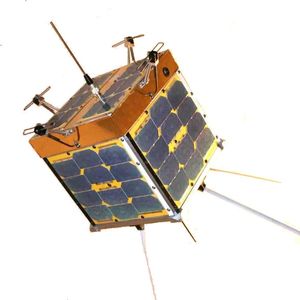KiwiSAT

Design Engineering and Construction
The design of KiwiSAT is based on the Microsat formula and is basically a system of trays clamped together in a box shape. Solar Cells cover the exterior to charge the batteries which are the prime power source for all on-board systems.
Various antenna are mounted on the top and bottom of the satellite in such a way as to give an excellent radiation pattern thus reducing signal strength variations common in many small satellites.
The satellite systems have been broken down into: Linear Transponder, FM Transponder and Command System, Power Supply, On-board Computer (Integrated Housekeeping Unit - IHU), Science Package and Structure.
Separate teams have developed each part, yet maintained close contact.
The satellite structure and hardware is effectively complete through to flight status. Work is now centred on software development - both flight and ground station - on the completion of which minor LV integration adjustments may be necessary prior to launch.
The antenna configuration developed for best performance limits the choice of launch vehicles due to final release requirements. This does not significantly limit the launch opportunities neither does it limit the choice of a suitable orbit.
Sub-assemblies have been assembled in various centres throughout New Zealand making this a truly nation-wide project.
Fred Kennedy, ZL1BYP, in his role as lead engineer, has contributed significantly to the development and construction of KiwiSAT. Importantly, Fred's prior experience in the satellite field, through contributions to AO-40 and similar international projects, has proved invaluable. Fred continues his dedication to the project.
Videos
Purpose-built Vacuum Chamber
Fred Kennedy, ZL1BYP
PCB Assembly and Translator Test
Solar Panel Assembly
Battery Charge Regulator
Hans Holtz ZL1HB on the Battery Charge Regulator (BCR) design philosophy
Main Framing Construction
Mike Jack of Stanier Engineering, a small specialist precision engineering company based in Auckland, milled the main frame from solid blocks of aluminium. We are most grateful to Mike for the use of his costly machinery and for donating his very valuable time to this project.
Mike and his CNC milling machine in action
